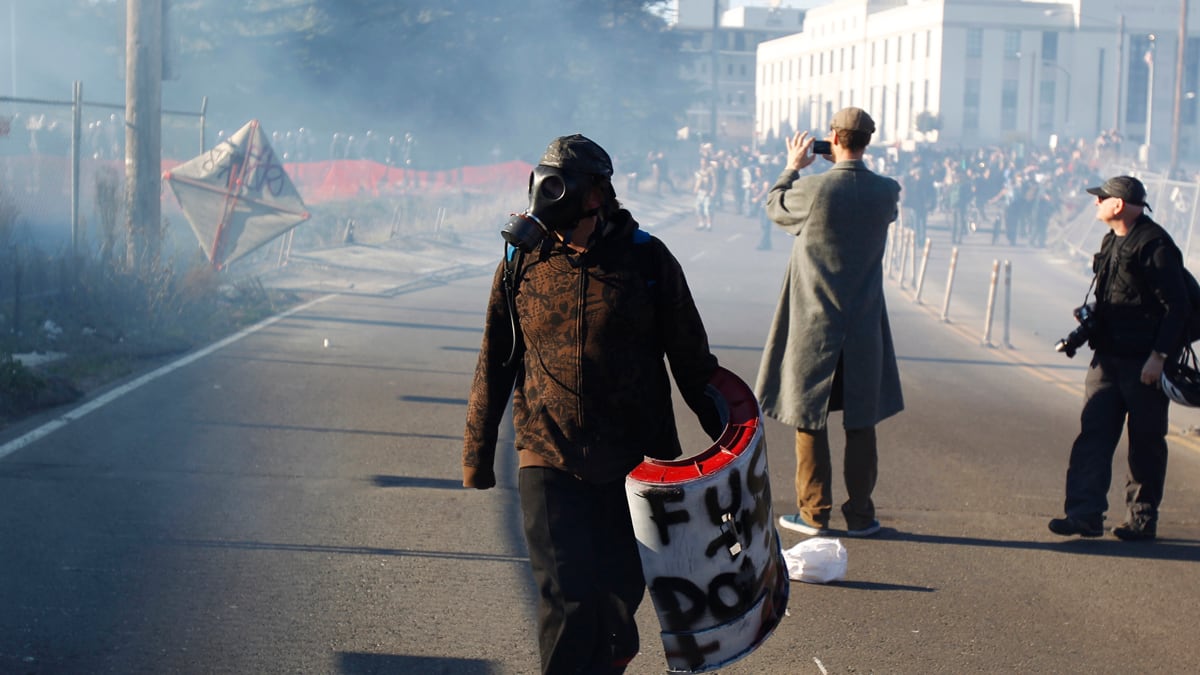The Occupy movement took a step backwards on the streets of Oakland, California this past weekend.
Late last year, the Occupy movement was novel and hopeful. People from all walks of life rallied to the cause from coast to coast. College students were especially drawn to the movement seeing their long struggle for fair tuition reflected in its amorphous demands against inequality. One couldn’t help but get wrapped up in the energy of such a diverse movement willing to absorb any offense against the other 99 percent.
I attended the first Oakland Port shutdown last December to witness the power of Occupy Oakland for myself. I saw young and old alike marching peacefully through the streets in the wake of the violent encounter with police a few days before. Instead of responding with violence of their own, the protestors shut down the port with decorum. At each gated entrance for over a mile, people sat and discussed the issues de jure peacefully with cops looking on. That day a statement was made.
Saturday’s chaos, on the other hand, was difficult to watch. TV footage showed a violent scene. Both police and occupiers acted with disregard for civility. Tear gas was launched at protestors as chairs were thrown back. The whole scene looked more like a civil war than a non-violent march.

It’s not easy to parse through the disorder of a protest gone terribly wrong. When 400 people are arrested, Oakland City Hall is left in tatters and an American flag is burned on its steps, blame tends to be difficult to assign. But in this case, police and protestors alike are culpable for the mayhem on the streets.
And, in the face of this debacle, young people are recoiling.
Over the weekend I talked with college students around the state who voiced their concerns. One student from UCLA lamented that Occupy’s leaderless model frustrates any attempt at real, lasting change. Another student, more involved in the movement, wished Occupy would evolve and begin talking about foreclosed homes with more vigor and abandon the guerilla street occupations. One U.C. Berkeley student found the violence had a reductive effect on the movement: With each skirmish it became more about police versus protestors than about fighting inequality and reforming our political system.
Indeed, if there is a lesson to be learned from Occupy Oakland’s violent rebirth Sunday, it’s that OWS is losing its base of moderate college youth. We didn’t rally around the protest beforehand and we didn’t come out in numbers. Now, in the aftermath, we are upset and disturbed. Regardless of whose fault it is, the West Coast Occupy brand is looking like a street brawl, not a public debate.
Millenials are turned off by this violence. We initially were attracted to the discussion circles, the devotion to consensus decisions, the people’s mike, and speeches by Joseph Stieglitz and Robert Reich. We like the debate about inequality and policy solutions like the Buffett Tax. We like drumming circles and the occupation of more justifiable public property like city parks. It is in the intellectual vitality of the early occupations that most youth found the motivation to join the movement.
As Oakland cleans up this week, it’s time for a change. The tired tropes of police brutality, radical occupiers, zip ties, tear gas, and vandalism have begun to lose their allure. We don’t want war. We want change.
OWS needs to adapt. It needs to come to its senses and better involve us, the youth. It’s time to occupy foreclosed homes, not city halls—and engage in politics, not street level scuffles with police. We want a national narrative about how to create a prosperous future for the rhetorical 99 percent. Occupy can dispel the myth that discussing inequality is synonymous with “class warfare” and can put social reform permanently on the national agenda. Or it can fall victim to the minefield of oppositional street politics.
The thoughtful protest innovator and the brutal anarchist are battling for the soul of the quixotic Occupy Movement. But if Occupy Oakland is to withstand the pressures inherent to an adolescent movement and sustain itself on the backs of progressive college students, the reformer elements will have to triumph.
My generation of young adults needs a movement capable of channeling its immense energy.
Occupy has it, but it’s on the verge of losing it.






